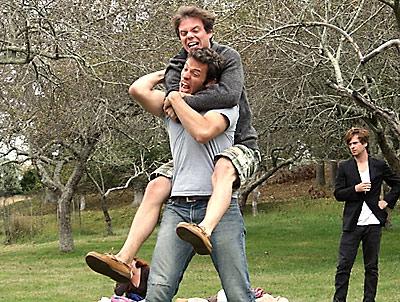Shakespeare, Outdoors and Sustainable

While many may spend the summer of 2012 waiting for the end of the world, those on the South Fork might remember it instead as the beginning of a renaissance in outdoor Shakespearean theater. Not one but two theatrical groups plan to stage productions, and both are taking their cues from the outdoors to leave a very small environmental footprint.
Joshua Perl recently announced Shakespeare@HITFest, which will present “A Midsummer Night’s Dream” in August on the grounds of the Bridgehampton School. In July, the Green Theatre Collective will mount “The Tempest” at Quail Hill Farm in Amagansett.
Hal Fickett, the founder of the collective, was introduced to the South Fork last year when he took his group to Quail Hill for two nights in September to perform “As You Like It.” He was there at the invitation of Scott Chaskey, the farm’s director, after he saw the group perform at Sylvester Manor on Shelter Island in July.
Quail Hill’s apple orchard will be the theater’s home base this summer, and members plan to present “The Tempest” there from July 18 to 22. The group will return to Sylvester Manor as well, from July 13 to 15.
The company earned enthusiastic praise for its 2011 performances, particularly for the minimal presentation of the plays, which are done without stage, lighting, or period costumes. Next year’s plans are even more ambitious, with another outdoor Shakespeare production and two more contemporary plays to be presented indoors in the spring and fall.
Mr. Fickett and his fiancée, Gina Rivera, whom he met as a company member last summer, plan to move to the South Fork full time beginning next month. “Our aim is to put down roots in the community,” he said.
If name is destiny, he was off to a good start, with a first name synonymous with Shakespeare and with a character, from Prince Hal to King Henry, who was central in three of the history plays.
Mr. Fickett grew up in Newburyport, Mass., and was introduced to theater in high school. “My first play was ‘Romeo and Juliet.’ I had been playing sports, but then I got the acting bug and turned to theater full time.” He enrolled in Emerson College and earned a bachelor’s degree in acting. He has lived in New York City since 2006.
The idea for the theater company came out of discussions he had with his grandfather before he died in 2008. Their goal was “to combine a passion and respect for the environment and the arts” by mounting theatrical performances to demonstrate they could leave a minimal environmental impact and incorporate an educational aspect as well.
“As You Like It” traveled to five locations in New York and Massachusetts and was seen by 600 people. He hopes to have 80 to 100 people at each performance at Quail Hill next summer. Each will be timed to end at sunset. “The apple orchard is pretty versatile . . . the trees form a natural theatrical space, a little amphitheater, and the acoustics are fabulous.”
The “green” in his theater collective is “emblematic of our aesthetic. Sustainable productions are all about minimalism.” He figured out how to break it down for the first show: They would need to perform in daylight with no set but with some sense of a stage or background in the landscape. Found objects would work as props. The costuming would make use of the actors’ own wardrobes.
“No waste would be created. That was the gist of how we created a production with no carbon footprint or a very small one.”
Bringing such a production indoors next year will lead to new challenges. “We will cross that bridge when we come to it. We have done this so far by tackling issues and finding solutions. It’s a very creative process and wonderful things can come out of it.”
The staging of the text is also minimal, as fewer scenes will require even fewer means of storytelling. “As You Like It” was cut to an hour and 40 minutes. “The Tempest” production will run about an hour and a half.
The biggest demand in such staging is on the actors. “All we really needed was ourselves. The emphasis was on the text and show itself and how each actor brought it life.” Last year, just seven actors played 26 roles. “Every actor played at least two roles and one did five. The way actors differentiated themselves in their roles was through a single prop or costume piece, but it often had to do with the way the body was used.”
Mr. Fickett hopes to bring back many of the actors from last year, including Ms. Rivera, who is now also the director of marketing and special events for the company. The couple will marry on June 2.
Although such a production has very little overhead, the group still needs to raise money in order to go forward. “We have a total budget of $12,000 for a span of four weeks of rehearsal and performances. There is a little money going to production costs, things like posters, programs, and transportation. The money is mostly going to the actors. I’m really looking to take care of the men and women who will be performing.”
He plans to keep ticket prices to no more than $20. He hopes for a collaborative relationship with other arts organizations on the East End and is looking to meet with many of them once he is here full time.
More information about the group is available at greentheatrecollective.org.
